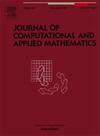基于自适应惯性校正策略的复合tseng型外聚算法求解分裂公共不动点约束下的双层分裂伪单调VIP
IF 2.1
2区 数学
Q1 MATHEMATICS, APPLIED
Journal of Computational and Applied Mathematics
Pub Date : 2025-04-09
DOI:10.1016/j.cam.2025.116683
引用次数: 0
摘要
研究了实数Hilbert空间中涉及半对称映射的双层分裂伪单调变分不等式问题(BSPVIP)和分裂公共不动点问题(SCFPP)。为了有效地解决SCFPP约束下的BSPVIP问题,我们提出了一种新的复合tseng型提取方法,该方法引入了自适应惯性校正项。我们的方法结合了惯性技术和自适应步长策略来提高算法效率。该问题由一个强单调算子的上阶变分不等式问题和一个两个伪单调算子的下阶分裂变分不等式问题组成。在温和的假设条件下,我们证明了算法的强收敛性。为了证明该方法的实用性,我们将其应用于分裂不动点问题约束下的BSPVIP问题。通过数值算例说明了该算法的性能,并分析了所涉及参数对算法性能的影响。本文章由计算机程序翻译,如有差异,请以英文原文为准。
Composite Tseng-type extragradient algorithms with adaptive inertial correction strategy for solving bilevel split pseudomonotone VIP under split common fixed-point constraint
This paper investigates the bilevel split pseudomonotone variational inequality problem (BSPVIP) and the split common fixed point problem (SCFPP) involving demimetric mappings in real Hilbert spaces. We propose a novel composite Tseng-type extragradient method that incorporates an adaptive inertial correction term to effectively address the BSPVIP under the SCFPP constraints. Our approach combines an inertial technique with a self-adaptive step size strategy to enhance algorithmic efficiency. The BSPVIP consists of an upper-level variational inequality problem for a strongly monotone operator and a lower-level split variational inequality problem for two pseudomonotone operators. Under mild assumptions, we establish the strong convergence of the proposed algorithm. To demonstrate the practical applicability of the method, we apply it to a BSPVIP under split fixed point problem constraints. A numerical example is provided to illustrate the algorithm’s performance and examine the influence of the involved parameters on its behavior.
求助全文
通过发布文献求助,成功后即可免费获取论文全文。
去求助
来源期刊
CiteScore
5.40
自引率
4.20%
发文量
437
审稿时长
3.0 months
期刊介绍:
The Journal of Computational and Applied Mathematics publishes original papers of high scientific value in all areas of computational and applied mathematics. The main interest of the Journal is in papers that describe and analyze new computational techniques for solving scientific or engineering problems. Also the improved analysis, including the effectiveness and applicability, of existing methods and algorithms is of importance. The computational efficiency (e.g. the convergence, stability, accuracy, ...) should be proved and illustrated by nontrivial numerical examples. Papers describing only variants of existing methods, without adding significant new computational properties are not of interest.
The audience consists of: applied mathematicians, numerical analysts, computational scientists and engineers.

 求助内容:
求助内容: 应助结果提醒方式:
应助结果提醒方式:


